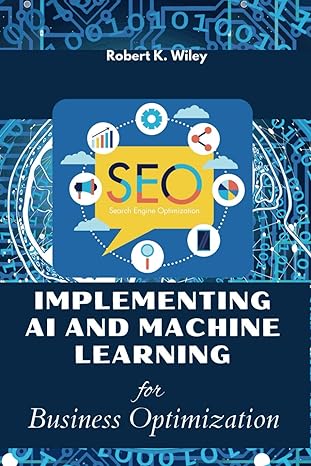Question
A research team needs a database to record information about an experiment they are conducting. Participants in the experiment will be assigned to one of
A research team needs a database to record information about an experiment they are conducting. Participants in the experiment will be assigned to one of two groups, answer a set of questions, view a text or video presentation about the topic, and then answer the same questions again (a pre-test/post-test experimental design). The team will analyze data recorded in the database to determine if there are any differences between the two groups' performance.
Example queries and reports:
- Compare demographic data of the two groups (e.g., average age).
- Calculate the time each participant took on the pre- and post-tests. Compare times within and between groups. (For example, did all participants complete the pre-test in approximately the same time? Was there a difference between groups on the post-test?)
- Compare pre- and post-test answers. Compare post-test answers between groups. Count the numbers of correct and incorrect answers on pre- and post-tests. Look at which researchers worked with which participants, to see if there were any differences among participants' times or responses.
Each research team member will administer the experiment to many participants, one participant at a time. The database records the first and last names of research team members, as well as the date they completed CITI certification (that qualifies them for working with human subjects).
The database records which group a participant was assigned to (text or video), and the date on which the participant did the experiment. It also records some demographic data: age, sex, highest degree earned, and current occupation.
The database stores the questions and answer choices for the experiment. Each participant is given the same set of questions and answer choices. The questions and answer choices are the same for the pre-test and the post-test. All participants are given the questions in the same order. For each question, the database contains the question number, the text of the question, and the text of each of the 4 answer choices (A, B, C, and D). For example, the text of question 1 is "How important are cats to the global economy?" The texts of the answer choices are: A) not at all, B) somewhat, C) a great deal, D) the world would fall apart if it weren't for cats.
The database records 4 timestamps: the time the participant starts reading the first question of the pre-test, the time the participant answers the last question of the pre-test, the time the participant starts reading the first question of the post-test, and the time the participant answers the last post-test question. It records the participants answers for each question of the pre-test (before viewing the presentation) and each question of the post-test (after viewing the presentation).
Generate an ER diagram from requirements descriptions.
Step by Step Solution
There are 3 Steps involved in it
Step: 1

Get Instant Access to Expert-Tailored Solutions
See step-by-step solutions with expert insights and AI powered tools for academic success
Step: 2

Step: 3

Ace Your Homework with AI
Get the answers you need in no time with our AI-driven, step-by-step assistance
Get Started


